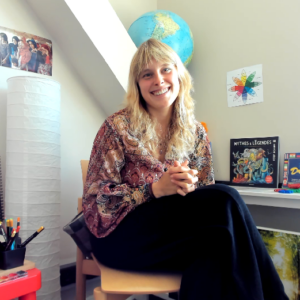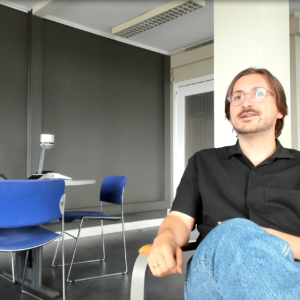
Angie Nicolas: “A school of life”
Angie Nicolas studied clinical psychology at the Université libre de Bruxelles and trained in psychotrauma. In this testimonial, she looks back on her first six months as a clinical psychologist at Solentra.
What do you like about working at Solentra?
What I find unique about working at Solentra is the open-mindedness that the job instils in me. Working with people from different countries and cultures challenges me to put my thinking aside for a moment and show genuine interest in the other person’s world. It is like a school of life, which teaches me to look beyond my own values and standards.
At Solentra, I learn to look at and understand the world in a new way: from geopolitics and international cooperation to how the asylum procedure and social services work in Belgium.
Working with interpreters is also very special. The connection the client feels with someone who speaks their mother tongue creates an interesting dynamic during consultations. After all, the mother tongue is the language of your emotions. When you express yourself in a new language, you speak from your head rather than from your heart.
What is the most difficult thing about your job? How do you handle it?
I find it difficult when clients tell me they perceive the system in Belgium as unfair. After all, I represent that system in their eyes. When that happens, I need to distance myself from the emotion and tell myself that I cannot change the procedures. I cannot change the legal status of clients, but I can help them deal with their anger or frustration and improve their situation that way.
It can also be challenging to stay in my role as a psychologist, as I tend to want to help on all levels when clients ask me for assistance. Explaining that something is not part of my job, is hard. I do try to refer them to others, like a social worker or a doctor, in a timely manner.
In some cases, a client might not show up for an appointment and fall out of touch. It is can be difficult to not take that personally. I then tell myself that maybe the person was not ready for the therapy we offer.
What training do you receive from Solentra?
When I had just started working at Solentra, I took many of our online courses designed to convey Solentra’s vision and methodology. This way, I learnt to adopt an open attitude, how best to deal with unaccompanied minors …
Moreover, every Wednesday we sit together with all the psychologists and discuss concrete cases. That’s actually a kind of training that continues throughout your career.
I also find it interesting to give trainings to other counsellors on Solentra’s method. I learn a lot from explaining certain topics to a group.
Other testimonials

Benji Jame: “You learn that your point of view is only one of thousands”
A big part of the job is empathising with someone. You have to be able to see the world through the eyes of the person sitting in front of you.
Read testimonial